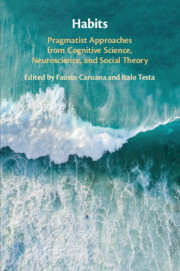Book contents
- Habits
- Habits
- Copyright page
- Contents
- Contributors
- The Pragmatist Reappraisal of Habit in Contemporary Cognitive Science, Neuroscience, and Social Theory: Introductory Essay
- Part 1 The Sensorimotor Embodiment of Habits
- Part II The Enactment of Habits in Mind and World
- Part III Socially Embeddded and Culturally Extended Habits
- 14 Growing Minds
- 15 “Habit Is Thus the Enormous Flywheel of Society”
- 16 Habit and the Human Lifespan
- 17 Habits and the Enculturated Mind
- 18 Brain, Body, Habit, and the Performative Quality of Aesthetics
- 19 A Habit Ontology for Cognitive and Social Sciences
- 20 Social Ontology between Habits and Social Interactions
- 21 Social Reproduction Feminism and Deweyan Habit Ontology
- Index
- References
14 - Growing Minds
Pragmatic Habits and Enculturation
from Part III - Socially Embeddded and Culturally Extended Habits
Published online by Cambridge University Press: 24 November 2020
- Habits
- Habits
- Copyright page
- Contents
- Contributors
- The Pragmatist Reappraisal of Habit in Contemporary Cognitive Science, Neuroscience, and Social Theory: Introductory Essay
- Part 1 The Sensorimotor Embodiment of Habits
- Part II The Enactment of Habits in Mind and World
- Part III Socially Embeddded and Culturally Extended Habits
- 14 Growing Minds
- 15 “Habit Is Thus the Enormous Flywheel of Society”
- 16 Habit and the Human Lifespan
- 17 Habits and the Enculturated Mind
- 18 Brain, Body, Habit, and the Performative Quality of Aesthetics
- 19 A Habit Ontology for Cognitive and Social Sciences
- 20 Social Ontology between Habits and Social Interactions
- 21 Social Reproduction Feminism and Deweyan Habit Ontology
- Index
- References
Summary
The classical pragmatists provided a clear set of leading ideas about what a habit is. This conception of “habit” is distinct from the behavioral conception of habit as a fixed disposition to respond to stimuli that has been enforced by the environment. This chapter focuses on developing a pragmatic account of habit based on leading ideas from Peirce and Dewey. It also argues that this account can play a useful role in the emerging account of cognition as culturally evolved and enculturated. The combined account demonstrates that the work of the classical pragmatists is as fresh and important now as it was a hundred years ago.
- Type
- Chapter
- Information
- HabitsPragmatist Approaches from Cognitive Science, Neuroscience, and Social Theory, pp. 297 - 319Publisher: Cambridge University PressPrint publication year: 2020
References
- 2
- Cited by

